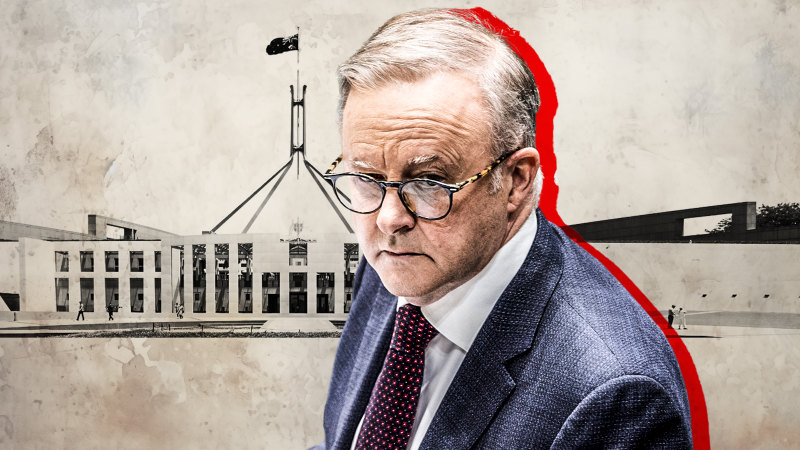Save articles for later
Add articles to your saved list and come back to them any time.
Labor caucus members know how to behave when Anthony Albanese delivers his weekly speech to their closed meetings in Parliament House, so none of them risk voicing a complaint about their leader or their government.
The prime minister, says one of them, knows how to settle scores.
Some MPs feel Anthony Albanese has not been listening to backbench MPs at informal gatherings as often as in the past.Credit: Alex Ellinghausen, Jamie Brown
But the Labor faithful are full of doubt about Albanese at the very time they put on a public show of total confidence in his response to the shocks buffeting the government.
Whether the problem is the High Court ruling on indefinite immigration detention or the Chinese navy’s use of sonar against Australian divers, the government looks slow when confronted with bad news.
What worries the Labor backbench most, however, is that households are being hammered with rising costs and their cabinet ministers do not have a convincing answer about what they will do next to help.
“People just don’t see us doing anything on issues for them,” says one MP who is anxious about the government’s performance.
Another MP is more diplomatic.
“Some are disappointed with the government,” he says. “But they’re not at the point of changing votes yet.”
In fact, some voters are already deserting Labor. The government’s primary vote fell from 37 to 35 per cent in the Resolve Political Monitor in this masthead earlier this month, before the detainee ruling made headlines.
Labor has an instant defence when asked about the cost of living because it has subsidised energy bills, increased childcare payments, boosted Medicare bulk-billing, cut the cost of medicines, lifted income support for pensioners, waived fees for TAFE courses and expanded paid parental leave.
In all the talking points, however, there is no compelling message about a future economic plan that offers new measures to bring down household costs.
One caucus member, speaking anonymously because those who go public can suffer retribution, is gloomy about what he calls “signs of decay” in the government.
The biggest sign is policy inertia, he says. Labor has delivered on its election promises but is yet to reveal a bold agenda for the future.
Another is a lack of preparation and poor response to events. While the government did not want to release detainees from indefinite detention, it was slow to react to the High Court ruling.
A third warning sign, but a contested view, is the isolated leadership. Some MPs feel Albanese has not been listening to backbench MPs at informal gatherings as often as in the past. There may be good reason for this because the prime minister has been on a series of necessary overseas visits. Even so, there is a rumbling of discontent.
Some MPs are privately fuming over decisions two weeks ago to cut road and rail projects in or near their communities. Opinions of Transport Minister Catherine King were already souring after she blocked more flights by Qatar Airways at a time of rising travel costs.
And progress is slow on some election promises. Labor introduced draft laws on Tuesday to set up its Help to Buy scheme to offer equity in 40,000 homes, but this was an election promise from May last year and needs matching laws in the states. Labor will be lucky to have significant results from this pledge by the next election.
One glaring problem is that Australians have become used to fiscal stimulus as a rapid fix for their economic ills, yet Labor cannot pick this box from the policy shelf. The government must not spend its way out of this problem if that spending fuels inflation.
Where is the solution? When Labor MPs discuss ideas, they point to successes such as the 60-day dispensing rule for medicines at the pharmacy. While the pharmacists campaigned against the change, it is on track to deliver $250 million in consumer savings.
Caucus members also like the subsidies for energy bills outlined last December with price caps on coal and gas exports. Industry opposed those changes as well, but Labor MPs would go further if they had their way.
Albanese assured the caucus on Tuesday morning, in their final full meeting for the year, that more action was coming on the cost of living. He reminded them of his message when they won power last year: “We’re not here to occupy the space, but to make a real difference.”
The prime minister basically promised new measures next year to lower the cost of living without adding to inflation. What will they be? That is a guessing game.
Only four MPs asked questions in the general discussion in Tuesday’s meeting and only one was about the economy – and it was merely a request to Treasurer Jim Chalmers to meet with backbenchers about the mid-year budget update due in December.
This sets up a forum to push for more results on the cost of living, but the suggestion was made very gently. And there is very little time for major policy change in the mid-year economic and fiscal outlook, so the economic package would probably have to wait until the May budget.
Labor backbenchers are showing patience in public despite their frustrations in private. Voters, however, have no reason to be so loyal. They could easily turn on Labor if they do not see more action.
Cut through the noise of federal politics with news, views and expert analysis from Jacqueline Maley. Subscribers can sign up to our weekly Inside Politics newsletter here.
Most Viewed in Politics
From our partners
Source: Read Full Article


